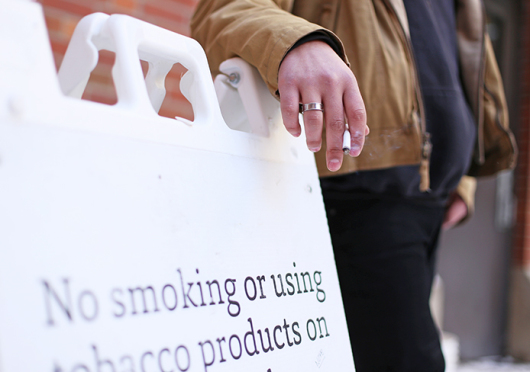
OSU tobacco-free student ambassadors hope to continue spreading awareness about the campus-wide tobacco-free initiative in their 2nd semester on the job. Photo illustration by Mark Batke / Photo editor
Drawing from personal experiences with tobacco use and smoking, the Ohio State tobacco-free student ambassadors have begun their second semester of representing the university’s tobacco-free campus initiative.
The 19 ambassadors are made up of both graduate and undergraduate students selected via an application process to aid in the process of educating the OSU community about the tobacco-free policy put in place Jan. 1, 2014.
OSU’s tobacco-free policy bans the use of tobacco chew, electronic cigarettes, snuff and snus, a spitless, moist powder tobacco pouch, in all university buildings and on all university-owned properties, including parking lots, garages and outside areas.
Much like the tobacco-free policy, the ambassadors are still in the beginning stages, and aim to educate OSU students and faculty about the repercussions of smoking, said Rebecca McAdams, a tobacco free coordinator at the Student Wellness Center.
The ambassadors were selected Fall Semester and spent much of that semester learning the tobacco-free policy. But as the ambassadors move into their second semester, they will start to apply what they’ve learned and start educating the community, McAdams said.
McAdams, who is a master’s candidate in public health and has worked as an admissions counselor, graduate assistant and academic counselor at OSU, said she helped review applications and educate the ambassadors during the Fall Semester and now works with the ambassadors on a biweekly basis to help prepare them for their work in the community.
“What I do is guide them as to what are the appropriate types of education that should be out there, and they can come to me with any questions,” McAdams said.
Tobacco-free student ambassador Maria Brnjic, a third-year in respiratory therapy, said she learned about the tobacco-free student ambassador program through her major, but decided to become an ambassador for personal reasons.
“I have had multiple family members suffer from lung cancer, as well as seen many hospital patients with chronic obstructive pulmonary disease and/or lung cancer all from smoking. I have also seen how difficult it is to quit,” she said in an email. “I hope to keep as many people on Ohio State’s campus away from the dangers of smoking and the impact it has on us and the people around us.”
Tobacco-free student ambassador Sarah Fischer, a first-year in environment, economy, development and sustainability, said she became an ambassador for similar reasons. She said both of her parents smoked and she watched them struggle to quit.
“I think my history of living with smokers is the biggest motivator. I know what it’s like to be around cigarette smoke all the time; it smells bad, it makes breathing difficult, and it’s just hard to concentrate on simple things like studying,” she said in an email. “Being an ambassador gives me the opportunity to help promote a healthy environment for me and other students.”
Fischer described the ambassador’s role as educating staff and students, as well as participating in events around campus.
“I think our main job, and what we spend most of our time doing, is approaching smokers on campus. It is our goal to be as respectful as possible when we inform them about the policy and ask them to put out their cigarettes,” she said.
“Besides that, we also take part in campus cleanup to reduce cigarette litter, and we’re in the process of creating presentations for student organizations and staff so that everyone can have a better idea of what ‘tobacco-free’ really means.”
Aside from the ambassadors’ weekly work within the community, the ambassadors have scheduled events around campus. The next event will be the week after spring break and will be a tobacco-free litter cleanup that is open to students. The ambassadors will be partnering with the Ohio Union to clean up hot spots on campus where there is known to be a lot of litter from cigarette butts, McAdams said.
Brnjic said being an ambassador has provided her with many positive experiences, but added that the most rewarding experience came when she and another ambassador approached someone smoking on campus.
“In January, I approached a gentleman who was smoking on campus,” she said. “Another TFSA and I informed him on the policy, and if he could consider it the next time he lights a cigarette on campus. He informed us that he has been trying to quit, and he asked us for resources.”
The experience was important to Brnjic because she said she felt as if she was actually impacting someone’s life.
“This was really exciting for me to be able to directly affect this man’s life and improve his chances of kicking the habit for good,” Brnjic said.
For Fischer, learning the tobacco-free policy and being able to educate staff and students about the policy has been an integral part of her role as an ambassador.
“I’ve realized that very few people know the details of the tobacco-free policy. I care more about being a part of that change,” Fischer said.
For students interested in becoming tobacco-free student ambassadors next fall, there will be an application process and will require a weekly time commitment, McAdams said.
“At this point, they are required to do an average of three hours a week,” she said.
As the current tobacco-free student ambassadors progress into their second semester, Brnjic said she hopes the group continues to grow and expand as an organization, while also focusing on the goal of making OSU tobacco-free.
“We are growing and expanding. Becoming tobacco-free at Ohio State has to be a collective goal, so it is really important that we all work together,” she said. “We encourage any student organizations to contact us about having us present, or any students in general to contact us about how to join our program next year.”


